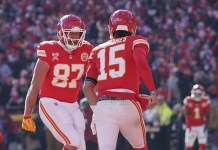LAS VEGAS–The Golden Knights are coming. The Raiders are coming. As Las Vegas welcomes major professional sports, the question now is when will the whole country reap the benefits? When will legalized sports betting be coming to the rest of America.
Let’s face it – and look forward to it. It is inevitable. It is not “if.” It is “when.”
Because the National Hockey League and the National Football League both decided to descend on “the evil empire” – a.k.a. the State of Nevada – you know that they have gotten past the issue of legalized gambling on sports. Proponents of expanded betting are optimistic, too, because a former casino owner by the name of Donald Trump happens to be President of the United States.
“We wouldn’t do it lightly,” the President told Westwood One on Super Bowl Sunday. “It will be studied very carefully.”
It is not just the White House that may move the needle. Monmouth Park racetrack president Bob Kulina confirmed to VSiN on Thursday that a Solicitor General’s brief is being prepared for the U.S. Supreme Court on New Jersey’s push to legalize sports gambling. That means we could get a sense of the Supreme Court's interest in taking on this topic by the summer.
In spite of objections led by the NFL and the NCAA, the blessing of the Supreme Court could flip the switch to launch sports betting in New Jersey. William Hill has already built a shop at Monmouth Park, and it is ready to go if and when the Supreme Court says yes.
But even if the court rules the other way, it will not alter a trend that has been decades – and billions – in the making. The federal government’s formal ban via the Professional and Amateur Sports Protection Act of 1992 led not to an end to sports betting but, instead, to a rise in illegal gambling both here and off shore. It is worth a fortune.
The American Gaming Association, which represents casinos across the country, says $150 billion in unregulated sports bets are made from the U.S. every year. The Nevada Gaming Control Board reports that a record $138 million was bet on Super Bowl LI. That is nothing compared with what was bet on the game outside Nevada – maybe $4.5 billion according to Fox Business.
The latest move in this direction of normalizing sports gambling came late this week when the Nevada State Gaming Commission signed off on legal wagering on this month’s NFL draft, a decision that even caught local bookmakers pleasantly surprised.
What used to be done with nudges and winks with bookmakers is now easily done in the palms of our hands with phones and tablets – and through daily fantasy sports, in which NFL team owners Jerry Jones and Robert Kraft have bought partnerships.
“I would probably tell you that I think society has probably had a little bit of a change with respect to gambling in general,” NFL commissioner Roger Goodell said last month, right after league owners approved the Raiders’ move to Las Vegas. “We still strongly oppose legalized sports gambling. The integrity of our game is number one. We will not compromise on that.”
But Goodell is missing the larger point. No one protects the integrity of any game more than bookmakers – not just in Nevada but around the world. They are the ones who follow the money more than anyone – especially if it moves in suspicious ways. Most obviously it was these bookies who flushed out the point-shaving scandal involving Arizona State University basketball 23 years ago.
It is simply ludicrous to think that legalizing sports wagering would lead to more crooked match-fixes. Taking a position on a sporting event has long been legal in the United Kingdom and Australia. While they certainly have seen bribes that dwarf the small salaries of some high-profile athletes, it is the bookmakers who have kept the matches honest. I don’t see either of those countries collapsing under the weight of fixed matches. As for professional athletes over here, they make far too much money to entertain the idea of taking the bait of a comparatively small-time bribe.
Yes, I concede a very valid point to the NCAA. In that world, where the players are not paid, you really have to keep a careful eye on what is going on. It is the very reason why there are lower betting limits on college games than professional games in many casinos in Las Vegas. All the more reason to legalize sports gambling. Getting ahold of what has been unregulated betting will give bookmakers and law enforcement much more of an upper hand on shady wagering before it has a chance to take root.
Give the FBI credit, too. It has had a big role in keeping sports on the up and up – and keeping an eye on criminal activity. If there is one thing we know about crooks, they don’t sit on the Phi Beta Kappa side of graduation. The men who were central figures in the Boston College point-shaving scandal three decades ago also robbed Lufthansa of nearly $6 million around the same time. They left a sloppy trail that the FBI got onto within a matter of days. What a mobster said a long time ago holds true – two people can keep a secret if one is dead.
Let’s not be naïve or stupid about human nature; there will be crooked activity. But it does not follow that because you can gamble legally instead of illegally on a game in New York or Florida that there will be more instances of it. That logic does not work with me, because the bookmakers and the feds are the ones keeping an eye on untoward activity, whether the bets are regulated or not.
Even if we get past misperceptions like Goodell’s and agree that oversight is already in place to beat back crooked gambling, there is still the problem of hypocrisy. Regardless of how anyone feels about legalizing sports gambling, we cannot have it both ways.
Think about it. There are 44 states plus the District of Columbia, Puerto Rico and the U.S. Virgin Islands that are running government lotteries, allowing tickets to be sold on every street corner. Some 28 states authorized legal gambling by taking advantage of the Indian Gaming Regulatory Act, which put the federal government in the casino business.
And let’s not forget daily fantasy sports, which are somehow not regarded by the government to be a form of gambling. That is a ridiculous conclusion that only serves to rationalize the revenue grab by stakeholders, including state governments and even sports leagues like Major League Baseball and the NBA.
But the biggest hypocrites of all are the ones who operate the NCAA. I am looking at you, university presidents and trustees. You run the largest, unregulated gambling business in the country. Do you really think that all those brackets that are filled out every spring are being played for the fun of it?
Think about what Warren Buffett did at Berkshire Hathaway. He offered any employee who could pick the Sweet 16 correctly a cool $1 million a year for life. As a consolation prize he paid $100,000 to the employee who predicted the most winners in an imperfect bracket. Buffett’s 85,000 employees filled out more than 100,000 brackets last month.
Americans spent $10.4 billion on brackets with 97 percent of that being unregulated. The American Gaming Association estimated that 70 million brackets were filled out with an average entry fee of $29. Call those innocent office pools if that is what lets you sleep at night, NCAA, but that sounds like gambling to me, complete with your logo front and center.
There are now four conferences that play their basketball championships in Nevada for the right to go to the NCAA Tournament. Correct me if I am wrong, but I have not seen anyone carted off to jail for fixing one game. The fans love it, and the NCAA should get off its high horse and bring a regional to Las Vegas. But I will not hold my breath. This is an organization that is too busy giving us incompetent referees for its biggest showcase to pass any legislation that makes sense in today’s world.
In the meantime, professional basketball is starting to get it. Adam Silver was the first commissioner to take a step forward to embrace gambling. As The Wall Street Journal pointed out in a story last week about sports betting, the NBA now offers the InPlay mobile app. It has turned daily fantasy into fantasy by the minute, a real-time contest that that may not be out-and-out betting on games, but it is close. And league research indicates fans who use it are watching NBA games for longer periods of time.
Since Silver and Major League Baseball commissioner Rob Manfred have shown that they are open to legalized betting, only Goodell and the NHL’s Gary Bettman among the big four are openly resistant, even as their leagues have overwhelmingly embraced bringing teams to Las Vegas.
They are all to be reminded that one of the best reasons for legalizing sports betting nationwide is the nation itself. Why are we allowing billions and billions of dollars to be bet off shore? We should repatriate that money here in the U.S., and let the states share in the revenue. Not only could states benefit, but so could leagues and their owners as partners in a very lucrative enterprise. It is a model that already works for European soccer and other sports overseas.
In one sense, America has already had legal sports gambling for more than a century – at least in one sport. Horse racing. So why is it that I can bet on 100-pound jockeys riding 1,200-pound animals but not on humans competing against humans? Yes, there have there been fixed races, but the watchdogs keep a pretty careful eye on it, and the republic has not fallen.
If I can bet on a horse race legally in Florida and California, why can’t I bet on a professional football or basketball game? What is the distinction here? It says here that it is hypocrisy – plus a sports establishment and a government whose emperors want to know what is in it for them.
But the momentum is clearly on the side of logic. No less an authority than former NBA commissioner David Stern told ESPN last fall, “My heart says it should be one to three (years away). My head says it’s between five and 10.”
Show them the money, and we will have legal sports gambling – maybe even in our lifetimes.
Planning on a trip to Las Vegas? Try VSiNHotels.com for hotel discounts up to 30 percent.





